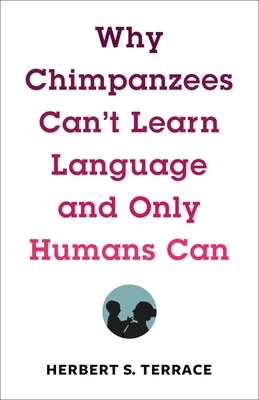

 Columbia University Press
Columbia University Press
Why Chimpanzees Can't Learn Language and Only Humans Can


Key Metrics
- Herbert S Terrace
- Columbia University Press
- Hardcover
- 9780231171106
- 8.8 X 5.8 X 0.8 inches
- 0.9 pounds
- Science > Cognitive Science
- English
 Secure Transaction
Secure TransactionBook Description
In this book, Terrace revisits Project Nim to offer a novel view of the origins of human language. In contrast to both Noam Chomsky and his critics, Terrace contends that words, as much as grammar, are the cornerstones of language. Retracing human evolution and developmental psychology, he shows that nonverbal interaction is the foundation of infant language acquisition, leading up to a child's first words. By placing words and conversation before grammar, we can, for the first time, account for the evolutionary basis of language. Terrace argues that this theory explains Nim's inability to acquire words and, more broadly, the differences between human and animal communication. Why Chimpanzees Can't Learn Language and Only Humans Can is a masterful statement of the nature of language and what it means to be human.
Author Bio
The general focus of my research is the evolution of intelligence with specific emphasis on cognitive processes that do not require language. In my primate cognition lab, I have trained rhesus monkeys to learn various serial tasks involving arbitrary and numerical stimuli. For example, I have shown how monkeys can become expert at learning rote lists similar to those we perform daily when dialing a phone number or entering a password. Instead of responding to Arabic numerals the monkeys respond to photographs displayed on a touch sensitive video monitor.
I also study how monkeys learn ascending and descending numerical sequences (e.g., 1-2-3-4, 4-5-6 or 6-5-4) and how they generalize their knowledge of specific numerosities to novel numerosities. In these experiments, stimuli are constructed from geometric elements and differ in the number of elements they contain.
In other experiments I study social learning in situations where a student monkey learns a new list by observing an expert perform that list. More recently, I have applied a similar paradigm to study cognitive imitation in autistic children. Taken together, these experiments show that many complex skills can be performed without language and provide a basis for understanding what language adds to those skills.
Most recently I've written about the evolution of language, in particular, the evolution of the world. Separating the evolution of language into two problems, the origin of words and the origins of grammar makes an intractable problem more manageable. In infants, we have begun to understand how pre-verbal emotional and cognitive relations between an infant and her mother lead to the production of the infant's firs words. Among human ancestors, a case can be made that words were invented by Homo erectus. Both types of word learning are discussed in my recent book, Why Chimpanzees Can't Learn Language and Only Humans Can (2019).
Source: Columbia University
Videos


Community reviews
Write a ReviewNo Community reviews